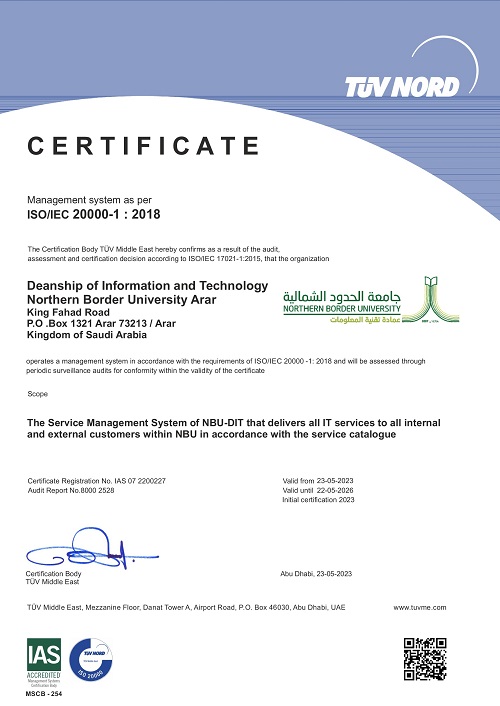Service Management System (SMS) Policy
“NBU-DIT is committed to continuously delivering and improving all IT services and solutions to its internal and external customers in accordance with ISO 20000 IT Service Management System standard and applicable legal and regulatory requirements.”
The policy embraces the following key principles:
- Ensuring that the service management policy and service management objectives are established and are compatible with the strategic direction of the organization.
- Ensuring that the service management plan is created, implemented, and maintained to support
the service management policy, and the achievement of the service management objectives and
service requirements.
- Ensuring that appropriate levels of authority are assigned for making decisions related to the SMS
and the services.
- Ensuring that what constitutes value for the organization and its customers is determined.
- Ensuring there is control of other parties involved in the service lifecycle.
- Ensuring the integration of the SMS requirements into the organization’s business processes.
- Ensuring that the necessary resources for the SMS and the services are available for
service management implementation.
- Ensuring staff training and awareness of service management.
- Communicating the importance of effective service management, achieving the
service management objectives, delivering value, and conforming to the SMS requirements.
- Ensuring that the SMS achieves its intended outcome(s).
- Directing and supporting persons to contribute to the effectiveness of the SMS and the services.
- Promoting the continual improvement of the SMS and the services.
- Supporting other relevant management roles to demonstrate their leadership as it applies to their
areas of responsibility.
- Operating with and maintaining good relations with all regulatory bodies and complying with
applicable regulatory requirements.
- Monitoring, measuring, and reviewing the performance of the SMS and the services.
Information Security Policy
NBU-DIT is committed to understanding and effectively managing risks related to Information Security to provide greater certainty and confidence for our stakeholders, employees, customers, suppliers, and for the communities in which we operate. Finding the right balance between information security risk and business benefit enhances our business performance and minimizes potential future exposures
: It is the policy of NBU-DIT to ensure
- Information will not be disclosed to unauthorized persons through deliberate or careless action.
- Confidentiality of information will be maintained.
- Information will not be disclosed to unauthorized persons through deliberate or careless action.
- The integrity of information through protection from unauthorized modification.
- Availability of information to authorized users when needed.
- All suspected breaches of information security will be reported and investigated.
- Regulatory and legislative requirements are met
- Responsibilities and accountability for information security are established.
- The current security threats within the environment are assessed.
The objectives of the policy are to:
- Assure and communicate the management direction and support for information security in accordance with NBU's business requirements and relevant laws and regulations
- Reduce the opportunity for mistakes and misunderstandings to occur when dealing with IT assets and information of NBU-DIT.
- Educate staff to allow them to independently make an informed decision concerning the secure handling of IT assets and information which NBU-DIT owns within the framework of the information security policies.
- Assist in the identification and investigation of fraudulent IS-related activities and cooperate with relevant legal agencies.
- Defend IT assets and information that NBU-DIT governs, owns, manages, maintains, or controls which are both tangible and intangible, and safeguard IT-related records and documents that exist in all forms – paper and electronic.
- Comply with the needs of the Regulatory Authorities (internal or external) and relevant legislation.
NBU-DIT applies the following policies:
|
No |
Policy |
Key Principles |
|
1 |
Organization of Information Security |
|
|
2 |
Asset Management |
|
|
3 |
Human Resources Security |
|
|
4 |
Physical and Environmental Security |
|
|
5 |
Communications and Operations Management |
|
|
6 |
Access Control |
|
|
7 |
Information Systems Acquisition, Development, and Maintenance |
|
|
8 |
Information Security Incident Management |
|
|
9 |
Business Continuity Management |
|
|
10 |
Compliance |
|

| ID | ISO 20000 CLAUSE - DOCUMENT NAME | DOCUMENT FILENAME |
|---|